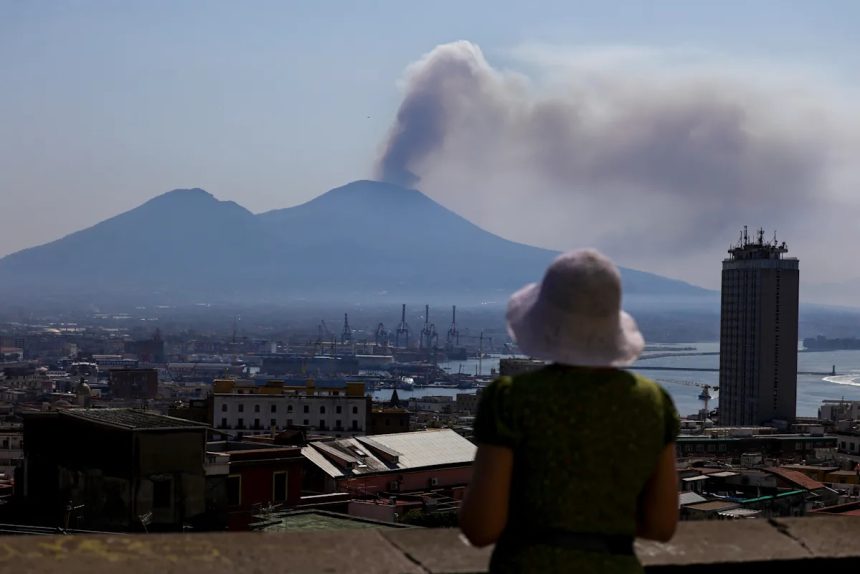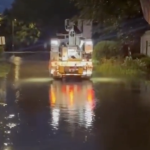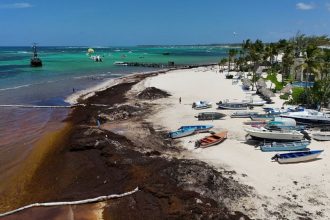Italian firefighters and the army on Sunday tackled a wildfire on the flanks of Mount Vesuvius, with all hiking routes up the volcano near Naples closed to tourists.
The national fire service said it had 12 teams on the ground and six Canadair planes fighting the blaze, which has torn through the national park in southern Italy since Friday. The park where a volcanic eruption buried the ancient city of Pompeii in 79 A.D. is a major tourist destination.
“The fire-fighting continues ceaselessly on three fronts”, the Campania Region said in a statement.
Authorities said the fires are largely on the slopes of the Mount Somma side of Vesuvius, which is characterized by its dense vegetation.
A tourist looks at the smoke of a big fire on Vesuvius Volcano appearing like an eruption. The fire has started during the night involving the woods of the Vesuvius National Park. / Credit: Salvatore Laporta/KONTROLAB/LightRocket via Getty Images
The army created a fire break and reinforcement firefighters were brought in from other areas of Italy, while onsite teams used drones to better monitor the spread of the fire, the region and fire service said.
The smoke from the fire could be seen from the Pompeii archeological site, which was buried by Vesuvius’ eruption during Roman times. The site, however, remained open to tourists.
The park’s head, Raffaele de Luca, said the area affected covered some 500 hectares, or over 1,235 acres.
“For safety reasons and to facilitate firefighting and cleanup operations in the affected areas, all activities along the Vesuvius National Park trail network are suspended until further notice,” the park said in a statement Saturday.
Nearly 620,000 people visited the crater of the active volcano in 2024, according to the park.

People watch the flames and smoke rising from a wildfire that breaks out at the Vesuvius National Park in Terzigno, a commune in Naples, Italy on August 8, 2025. / Credit: Eliano Imperato/Anadolu via Getty Images
Experts say European countries are becoming ever more vulnerable to wildfires due to intensifying summer heatwaves linked to global warming. Parts of the continent had recorded its hottest June in recent history.
The abnormally hot weather exposed millions of Europeans to high heat stress with temperatures in June more typical of July and August, said Samantha Burgess of the European Center for Medium-Range Weather Forecasts.
In Spain, more than 1,000 people were evacuated on Sunday in the country’s northwest region as wildfires spread, fueled by scorching temperatures and strong winds, authorities said.
Around 400 people were displaced in and around the town of Carucedo, and another 700 from several towns near the UNESCO World Heritage Site of Las Medulas, a former Roman gold-mining area known for its striking red landscape, local officials said.
Last week, France battled what authorities called the country’s largest wildfire in decades. About 1,400 firefighters were deployed Saturday in France’s southern Aude region to prevent it from reigniting, the Associated Press reported. High temperatures in the coming days are expected to complicate firefighters’ efforts.
On Mount Vesuvius, “the firefighting efforts are particularly delicate due to both the weather conditions — high temperatures and wind — and the pine needles, which contribute to the spread of the flames,” said Italo Giulivo, head of the region’s civil protection department.
Italy’s biggest agricultural association, Coldiretti, said the fires were “an enormous disaster” for vineyards and farms in an area well known for its wine, apricots and tomatoes.
The local prosecutors’ office has opened an investigation into the origin of the fires.
In Greece, one person was killed after a massive wildfire rapidly spread in the south on Friday, destroying homes and forcing evacuations, CBS News partner BBC reported.
Families of Israeli hostages, Palestinians plead for a ceasefire
Trump’s ex-surgeon general says “people are going to die” after RFK Jr. cuts mRNA vaccine funding
Rep. Tony Gonzales “encouraged” by immigration operations, but “who is being detained” matters









